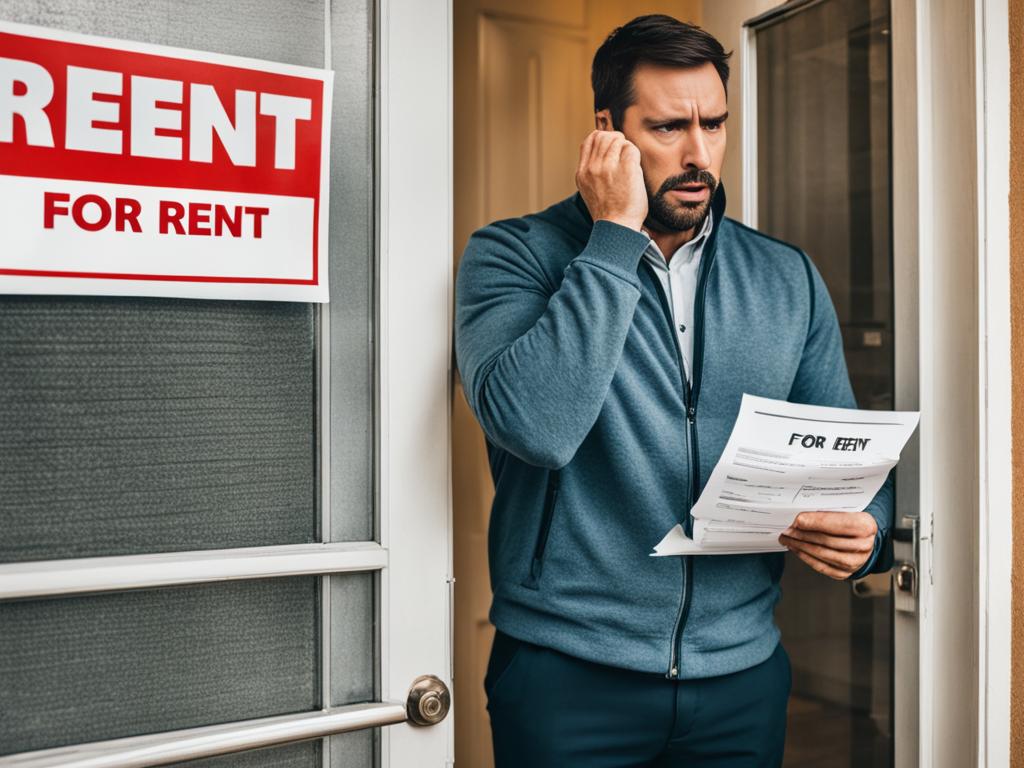Landlord Issues? Help When Your Landlord Ignores You.
Dealing with a landlord who ignores you can be incredibly frustrating and leave you feeling helpless. Whether it’s a lack of response, unanswered calls, or a refusal to address your concerns, being ignored by your landlord can disrupt your peace of mind and jeopardize your living situation. However, it’s important to remember that you have rights as a tenant, and there are steps you can take to address the issue and find a resolution.
When your landlord is ignoring you, it’s crucial to understand your rights and take appropriate action to protect yourself. This article will guide you through the process of dealing with a neglectful landlord and provide you with legal advice to ensure your rights as a tenant are upheld.
Key Takeaways:
- Being ignored by your landlord can be frustrating and leave you feeling powerless.
- As a California tenant, you have specific rights that protect you from neglectful landlords.
- Communicating your concerns in writing and keeping records of all interactions is crucial.
- If your landlord continues to ignore you, consider seeking assistance from local tenant resources.
- Withholding rent and repair and deduct options are available in California but must be exercised correctly.
Understanding Your Rights as a California Tenant
As a tenant in California, it is crucial to be aware of your rights and protections under the law. California tenant rights ensure that you have a safe and habitable living environment and that your landlord fulfills their responsibilities. Understanding these rights empowers you to take action if your landlord is neglecting their obligations.
Key Tenant Rights in California
California law guarantees specific rights to tenants, including:
- The right to a habitable rental property
- The right to have necessary repairs made promptly
- The right to reasonable notice before entering your rental unit, except in emergencies
These rights are established to protect you from landlords who may disregard their responsibilities and overlook essential repairs or maintenance.
Habitable Rental Property
Under California law, landlords are legally obligated to maintain a habitable rental property. This means that your rental unit must meet specific standards to ensure your health and safety. Some of the key requirements for a habitable rental property in California include:
- Functioning plumbing, heating, and electrical systems
- Proper sanitation, including the absence of pests and waste
- Adequate ventilation and natural light
- Structural integrity and protection from potential hazards
If your landlord fails to maintain a habitable living environment, you have the right to take action to protect yourself and your well-being.
Repair Responsibilities
Additionally, California law mandates that landlords address necessary repairs in a timely manner. If you report a repair issue to your landlord, they are legally obligated to address it promptly. Examples of repair issues that should be addressed by your landlord include:
- Leaking pipes or roofs
- Inadequate heating or cooling systems
- Mold or pest infestations
- Lack of hot water
If your landlord fails to respond to repair requests or ignores your concerns, you have rights and legal options available to ensure the necessary repairs are made.
| Tenant Rights in California | Key Details |
|---|---|
| The right to a habitable rental property | Landlords must maintain a safe and sanitary living environment, meeting specific standards for plumbing, heating, sanitation, ventilation, and structural integrity. |
| The right to have necessary repairs made | Landlords must promptly address repair issues reported by tenants, ensuring that essential systems and living conditions are maintained. |
| The right to reasonable notice | Landlords must provide reasonable notice before entering a rental unit, except in emergencies. |
To fully understand your rights as a California tenant, it is recommended to review the relevant laws and consult local tenant resources or legal professionals. By being informed about your rights, you can assert yourself and take appropriate action if your landlord is ignoring your concerns or failing to meet their obligations.
Resolving Issues with Your Landlord
Dealing with a difficult landlord can be challenging, but it’s important to take proactive steps to resolve any issues you may be facing. Here are some strategies on how to handle problems with your landlord and mitigate conflicts:
- Communicate in Writing: When addressing concerns with your landlord, it’s crucial to put your complaints in writing. Provide a detailed description of the problem, including dates and specific instances, to ensure clear communication. Request a response within a reasonable timeframe to demonstrate your seriousness in resolving the issue.
- Keep Records: Maintain a detailed record of all communication with your landlord. This includes emails, letters, and phone calls. Keeping a log of interactions will help establish a timeline of events and provide evidence if the situation escalates.
- Seek Local Tenant Resources: If your landlord continues to ignore your concerns, consider reaching out to local tenant resources and organizations for guidance and support. These organizations can provide valuable advice on navigating landlord-tenant disputes and may even offer mediation services to help resolve conflicts.
- Consider Legal Action: If all attempts to resolve the issue amicably have failed, you may need to consider taking legal action to protect your rights as a tenant. Consult with an attorney specializing in landlord-tenant law to explore your legal options and determine the best course of action.
Remember, proactive communication and documentation are essential when dealing with a difficult landlord. By taking these steps, you can work towards resolving conflicts and ensuring a satisfactory resolution for both parties involved.

Withholding Rent and Repair and Deduct Options in California
As a tenant in California, you have certain rights when it comes to addressing necessary repairs in your rental property. If your landlord fails to make these repairs, you have the option to withhold rent or use the repair and deduct remedy. Let’s explore these options in more detail.
Rent Withholding
Rent withholding allows you to withhold rent until the necessary repairs are made by your landlord. It is important to note that you can only take this action if the repairs needed make the rental unit uninhabitable. Before withholding rent, ensure you follow these steps:
- Notify your landlord in writing about the needed repairs and the intent to withhold rent until the repairs are completed. Keep a copy of the notice for your records.
- After a reasonable amount of time has passed without the repairs being made, you can withhold the rent.
- Set aside the withheld rent in a separate account to demonstrate your good faith.
- Once the repairs are completed, you must pay the withheld rent to the landlord.
Remember, rent withholding should only be used as a last resort when the rental unit becomes uninhabitable due to the necessary repairs not being addressed. It is advisable to consult legal resources or tenant assistance programs to understand the specific conditions and procedures that must be followed to exercise this remedy properly.
Repair and Deduct
The repair and deduct remedy allows you to make the repairs yourself and deduct the cost from your rent. However, it is important to follow certain guidelines:
- Notify your landlord in writing about the needed repairs and your intent to make the repairs yourself if they are not addressed within a reasonable time frame. Keep a copy of the notice.
- Obtain estimates or invoices from licensed contractors or repair services to document the cost of the repairs.
- Make the repairs or hire someone to do so. Keep receipts and any relevant documentation.
- Subtract the cost of the repairs from your next rental payment.
- Provide your landlord with a copy of the receipts and a written explanation of the deduction.
Similar to rent withholding, the repair and deduct remedy should only be used for necessary repairs that make the rental unit uninhabitable. Consult legal resources or tenant assistance programs to ensure you follow the proper conditions and procedures.
| Option | Conditions | Pros | Cons |
|---|---|---|---|
| Rent Withholding | The rental unit becomes uninhabitable due to necessary repairs being ignored by the landlord. | – Allows tenants to put pressure on the landlord to make repairs – Demonstrates tenant’s commitment to resolving the issue |
– Can lead to strained relationship with the landlord – Requires proper documentation and compliance with legal procedures |
| Repair and Deduct | The rental unit becomes uninhabitable, and the repairs are not addressed in a reasonable timeframe. | – Allows tenants to take immediate action in making necessary repairs – Provides a financial solution |
– Costs incurred by the tenant may not be fully reimbursed – Requires proper documentation and compliance with legal procedures |
Remember, both rent withholding and the repair and deduct remedy have specific conditions and procedures that must be followed in California. It is crucial to familiarize yourself with these requirements and consult legal resources or tenant assistance programs for guidance.
Other Options for Dealing with a Landlord Who Ignores You
While withholding rent and the repair and deduct remedies are effective options, there are other steps you can take if your landlord continues to ignore you. These include:
- Filing complaints with relevant agencies overseeing landlord-tenant issues, such as the California Department of Fair Employment and Housing or local city or county agencies: By reporting your concerns to these authorities, you can seek intervention and ensure that your landlord is held accountable for their actions.
- Seeking legal advice from attorneys specializing in landlord-tenant law: Consulting with a legal professional can provide you with a deeper understanding of your rights and the legal recourse available to you. They can guide you through the process of addressing your landlord’s behavior and help you explore potential legal remedies.
Exploring these alternative options can help you assert your rights and find resolution in situations where your landlord consistently ignores you.

Comparison of Alternative Options
| Alternative Options | Key Benefits |
|---|---|
| Filing complaints with relevant agencies | – External oversight and enforcement – Protection of tenant rights – Potential penalties and sanctions for the landlord |
| Seeking legal advice | – Expert guidance and support – In-depth understanding of landlord-tenant law – Potential legal remedies and actions |
Understanding Why Landlords Ignore Tenants
Landlords may ignore tenants for various reasons, including being busy or overwhelmed, lacking the resources to address the issue, or simply being unresponsive or negligent. It is essential to try to understand the reason behind your landlord’s behavior before taking action. However, it is important to note that regardless of the reason, landlords have legal obligations to maintain habitable rentals and address tenant concerns. Knowing your rights and available options can empower you to address the situation effectively.
Reasons Landlords Ignore Tenants
There can be several reasons why landlords ignore tenants:
- Busy or Overwhelmed: Landlords may have a lot on their plate, such as managing multiple properties, handling maintenance requests, or dealing with financial issues. This can make them less responsive to tenant concerns, especially if they are juggling multiple responsibilities.
- Lack of Resources: Some landlords may lack the financial means or necessary resources to address tenant issues promptly. They may avoid communication or delay repairs due to budget constraints or difficulty finding qualified contractors.
- Unresponsiveness or Negligence: In some cases, landlords may simply be unresponsive or negligent, failing to prioritize tenant concerns or fulfill their responsibilities. This can be due to a lack of professionalism, disregard for tenant well-being, or a general indifference towards maintaining a positive landlord-tenant relationship.
Regardless of the reason, it is important to remember that landlords have legal obligations to provide habitable rentals and address tenant concerns. Your well-being and living conditions should not be compromised due to a landlord’s negligence or lack of responsiveness.
Understanding the reasons behind your landlord’s behavior can help you determine the most appropriate course of action. In some cases, open and respectful communication may resolve the issue, while in others, you may need to explore legal options or seek assistance from local tenant resources.

Remember, as a tenant, you have rights, and it is crucial to assert those rights when faced with a landlord who ignores you. By being informed, proactive, and persistent, you can protect your interests and ensure a safe and livable rental environment.
Filing a Complaint Against Your Landlord
If all else fails and your landlord continues to ignore your concerns, you may need to take further action by filing a complaint against them. Filing a complaint can be an effective way to escalate the situation and seek resolution. Here’s what you need to know about filing a complaint against your landlord:
Reporting to relevant government agencies:
To initiate a complaint against your landlord, you can report them to the appropriate government agencies. In California, you can reach out to the local housing authority or the California Department of Fair Employment and Housing. These agencies are responsible for overseeing landlord-tenant issues and can help mediate disputes or take appropriate action against non-compliant landlords.
Documenting the issue:
Before filing a complaint, it is crucial to gather evidence and document the issue thoroughly. Maintain a record of all communication with your landlord, such as emails, texts, or letters. Take photos or videos to capture any visible problems or violations of your rights as a tenant. This documentation will strengthen your case and provide essential evidence when filing a complaint.
Consulting with a landlord-tenant attorney:
If your landlord has violated specific laws or breached your lease agreement, you may have grounds for legal action. Consulting with an attorney who specializes in landlord-tenant law can provide valuable guidance and help you navigate the complaint process. They can assess the strength of your case, advise on the best course of action, and represent your interests if legal proceedings become necessary.
Filing a complaint against your landlord is a serious step, and it is crucial to have a solid understanding of the process and your rights as a tenant. Seeking professional legal advice can significantly increase your chances of success and ensure that you take the appropriate actions to address the issue.

Conclusion
Dealing with a landlord who ignores you can be incredibly frustrating and stressful. However, it’s crucial to remember that as a tenant, you have rights and options available to address the issue effectively. Understanding your rights, communicating your concerns clearly and in writing, and exploring remedies such as withholding rent or repair and deduct can help you assert your position and find a resolution.
If your landlord continues to ignore you despite these attempts, don’t hesitate to seek assistance from legal resources or tenant organizations. They can provide valuable guidance and support in dealing with landlord-tenant disputes and help ensure that your rights are protected. Remember, standing up for your rights and holding your landlord accountable is essential for maintaining a healthy and fair landlord-tenant relationship.
By being proactive and knowledgeable about your rights, you can navigate through the challenges of a landlord who ignores you and find a satisfactory resolution. Don’t hesitate to lean on the available resources and take the necessary steps to assert your rights as a tenant.
FAQ
What are my rights as a tenant in California?
As a tenant in California, you have rights that protect you from neglectful landlords. These rights include the right to a habitable rental property and the right to have necessary repairs made in a timely manner.
How can I resolve issues with my landlord?
Start by communicating your concerns in writing and keeping records of all communication. If your landlord continues to ignore you, seek assistance from local tenant resources and organizations or consider legal action.
Can I withhold rent or use the repair and deduct remedy in California?
Yes, California tenants have the right to withhold rent or use the repair and deduct remedy if their landlord fails to make necessary repairs. However, there are specific conditions and procedures that must be followed.
What are the other options for dealing with a landlord who ignores me?
You can file complaints with relevant agencies, seek legal advice from attorneys specializing in landlord-tenant law, or explore other legal recourse options.
Why do landlords ignore tenants?
Landlords may ignore tenants for various reasons, such as being busy, lacking resources, or being unresponsive or negligent. It is important to understand the reason behind their behavior before taking action.
How can I file a complaint against my landlord?
You can file a complaint against your landlord by reporting them to relevant government agencies or seeking legal advice to explore potential legal remedies.

